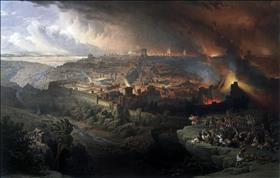The ancient sages' penetrating vision
The lessons of the 9th of Av then and now
Israel and the Jewish World have entered the national fast day of Tisha b’Av, symbolizing the destruction of the First and Second Temples, as well as many other difficult events in Jewish people’s history. Many understand that today's test is not just about remembering the past, but in drawing lessons for the future.
Uri Regev 30/07/2020 10:08
Tags: Tisha b'Av · Sages · Haredim · Hatred

Destruction of the 2nd Temple, source: Wikipedia
Israel and the Jewish World have entered the national fast day of Tisha b’Av, symbolizing the destruction of the First and Second Temples, as well as many other difficult events in Jewish people’s history. Many understand that today's test is not just about remembering the past, but in drawing lessons for the future. It is important to become acquainted with the penetrating vision of many of Israel’s great sages from the periods of the Mishnah and the Gemara, who did not shy away from harsh social criticism, which was considered to have no less religious significance than arguments over ritual practice.
Today in Israel and around the world it is difficult not to draw a connection between the destruction and decrees of the past with the deadly pandemic and the crises we face on many fronts.
The explanations given by ancient sages for the destruction of the First and Second Temples are very well known. It is interesting that while the sages’ explanations were broad and comprehensive, covering both the religious sphere and the social sphere, the explanations provided today by the ultra-Orthodox rabbinical leadership regarding the corona phenomenon mainly emphasize religious matters. Their starting point is that this is not a natural pandemic, but rather one wrought by the hand of God, and according to them the debate is only over which of humanity’s sins brought this punishment upon the world [or whatever other message a rabbi aims to convey].
And so we find both in ultra-Orthodox writings today and in the words of ancient Jewish sages an emphasis on the coming of the destruction of the First Temple / the plague due to the desecration of Shabbat, non-compliance with the laws of prayer, lack of commitment to Torah study, lack of respect for the elderly, and more [today, of course, there is also the terrible sin of using the Internet]. As for the destruction of the Second Temple, that is commonly explained as God’s response to "limitless hatred" within Israelite society. However, today’s spokesmen for ultra-Orthodox society sharply criticize the hatred of religion and hatred of the ultra-Orthodox, which, in their opinion, is characteristic of the police, the secular public, and in general. They are utterly blind in how they relate to secular society. [For example: “a generation of people who look like human beasts and behave like two-legged animals,” in the words of MK Israel Eichler.]
Today’s spokesmen for ultra-Orthodox society sharply criticize the hatred of religion and hatred of the ultra-Orthodox, which, in their opinion, is characteristic of the police, the secular public, and in general. They are utterly blind in how they relate to secular society.
In light of this, and the processes of fracture occurring In Israeli society today, It is especially important to review the religious and social psyches of some of the ancient sages, which are so topical and relevant today. Unfortunately, their approach is almost completely absent from the statements of the official leadership of the Zionist Orthodox and ultra-Orthodox Israeli communities, as well as from the statements made by many of the State’s leaders:
The ancient text of the Tosefta Menachot 13 explains the Exile and the destruction of the Second Temple as follows: “in the later one (Second Temple period) they labored in Torah and were careful with tithes, so why were they exiled? Because they loved money and hated each other. This comes to teach you that hating one’s fellow is difficult in God’s eyes, and the Torah considered it equivalent to idolatry, sexual immorality and the spilling of blood.”
To this must be added the determination, which, had it not been written in the Gemara, they would surely have denied its credibility, which is of special importance to the battles over religion and state taking place today, and the rigid demands of the religious establishment to increase religious coercion by legislation, to increase the powers of rabbinical courts, and to protect them from the Supreme Court’s intervention:
Bava Metzia 30b “Rabbi Yoḥanan says: Jerusalem was destroyed only for the fact that they adjudicated cases on the basis of Torah law ... That they established their rulings on the basis of Torah law and did not go beyond the letter of the law.”
Any additional words would be unnecessary.